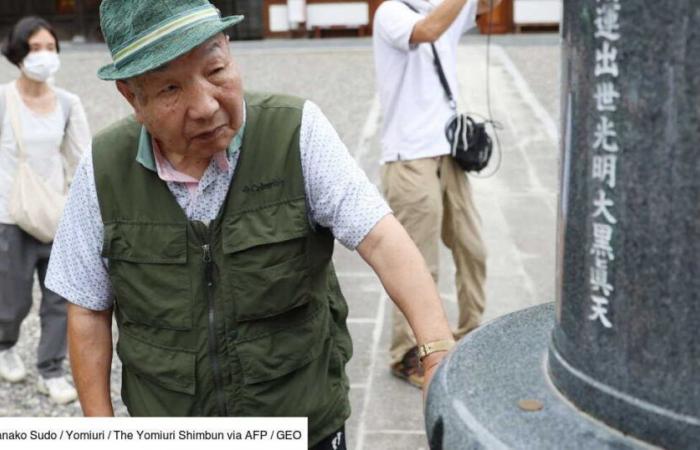Iwao Hakamada, an 88-year-old Japanese man, was found innocent Thursday of the quadruple murders for which he was convicted in 1968 and spent 46 years on death row. Just minutes after the verdict in the retrial of the extraordinary case, the elderly man was filmed by Japanese media leaving his home.
More than half his life in prison
Physically and mentally weakened by nearly five decades of awaiting execution, the world’s longest-serving death row inmate did not attend the hearing in Shizuoka, not far from where he lives.
Dressed in a hat and a sleeveless vest over a light-colored shirt, Hakamada walked down a few steps, supported by relatives who, according to local media, made sure he would not watch television when the verdict was announced.
Reporters Without Borders spotlights Japan in a photo series1
The case, which began in 1966, is a symbol for supporters of the abolition of the death penalty in Japan, who are fewer in number in the archipelago according to polls than those who are in favour of it.
A former boxer who became an employee of a miso (fermented soybean) manufacturing company, Iwao Hakamada was accused of murdering his boss and three members of his family in 1966 and was sentenced to death two years later.
Fabricated evidence
On Thursday, the judge’s findings seriously called into question the investigation.The court found that three pieces of evidence had been fabricated suggesting that the accused was the perpetrator of the crime. Excluding these pieces of evidence, the other evidence against him is not sufficient to establish that he is the perpetrator.“crimes,” the judge said in his reasons.
He also called the method of interrogation “inhuman“because it aimed to inflict a”physical and mental pain” and to “compel to make statements“, a thesis that his lawyers have always defended.
At the time of the events, he initially confessed to being the author of these murders before retracting, citing the interrogation methods. However, his death sentence was confirmed in 1980 by the Japanese Supreme Court.
In 2014, a court admitted doubts about his guilt after tests showed that DNA found on bloody clothing did not match his own. This was confirmed by the judge on Thursday, explaining that “Investigators altered the clothes by putting blood on them“.
After this episode, Iwao Hakamada was released. But the path to obtain this retrial was particularly long and tortuous. On appeal by the prosecution, the Tokyo High Court questioned in 2018 the reliability of the DNA tests and annulled the 2014 decision, without however sending Iwao Hakamada back to prison.
In 2020, there was a new twist: the Supreme Court overturned the decision that prevented Iwao Hakamada from being retried. And so it was the verdict of this retrial that Hakamada, his relatives, led by his sister Hideko, 91, and his supporters were waiting for.
Fear of a call
This verdict obviously pleased his supporters, gathered in front of the Court from the start of the day.The verdict was what we expected. It is a very long fight. Our next action is to demand that the prosecutors do not appeal” said Akiko Abe, a 64-year-old Japanese woman, fearing that the prosecution would use this right.
There are people who suffer from false accusations because the police try to jump to conclusions. I think there are many cases where we can’t really trust the police and not know if they’ve done a thorough investigation..
According to his relatives, Iwao Hakamada suffers significant psychological after-effects after spending nearly five decades on death row, often in solitary confinement, where each day could be his last, as provided for by Japanese law.
“We fought a battle that seemed endless for so long“, his sister Hideko had declared a few weeks before the liberation verdict.
Death row inmates in Japan are often given last-minute warnings that they will be hanged within hours, as hanging is the only accepted method of capital punishment in the country, which has just over 100 death row inmates in its prisons.
“Hakamada has not been treated with dignity for half a century. With this verdict, I hope he will spend the rest of his life with dignity.“, Fumio Ogura, a 74-year-old Japanese man, told the court.
“All reproduction and representation rights reserved. ©2024 Agence France-Presse. All information (text, photo, video, still or animated infographics, sound or multimedia content) reproduced on this page is protected by current legislation on intellectual property rights. Consequently, any reproduction, representation, modification, translation, commercial exploitation or reuse in any way whatsoever is prohibited without the prior written consent of AFP, with the exception of personal non-commercial use. AFP cannot be held responsible for delays, errors, omissions that cannot be excluded in the field of press information, nor for the consequences of actions or transactions carried out on the basis of this information. AFP and its logo are registered trademarks.”






